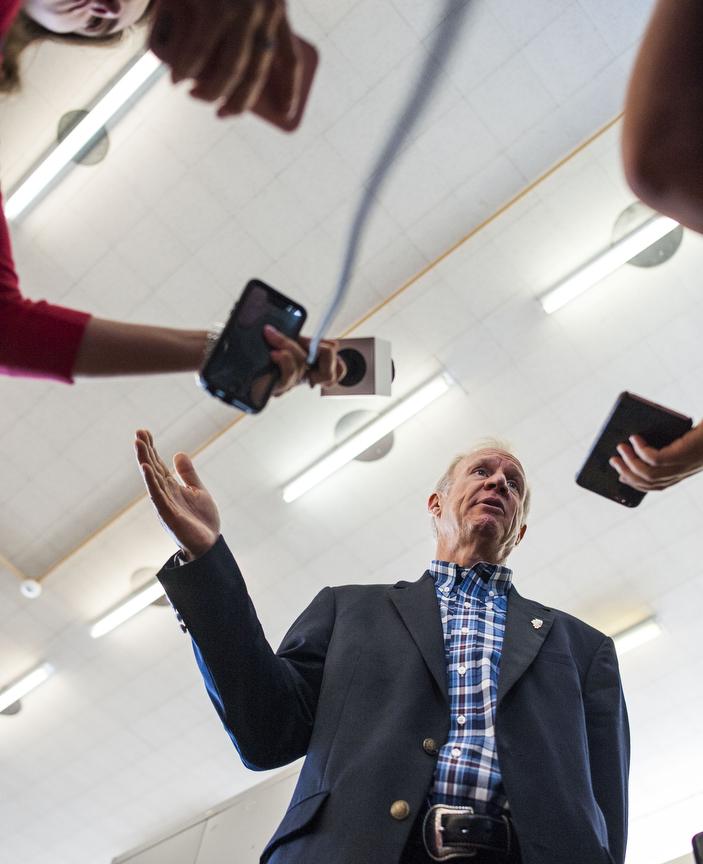Rauner: A ‘moral obligation to work together’
Illinois Gov. Bruce Rauner speaks with members of the media Friday, Aug. 26, 2016, following his visit to Carbondale High School’s Rebound program. (Ryan Michalesko | @photosbylesko)
January 25, 2017
Against the backdrop of a sharply divided and dysfunctional state government, Republican Gov. Bruce Rauner delivered a State of the State address Wednesday in which he said politicians have a “moral obligation” to fix Illinois.
In a wide-ranging speech that included restating many items on his agenda to help the business community and alter the state’s political system, Rauner also touched on the gun violence in Chicago — an issue that President Donald Trump tweeted about Tuesday night saying he might “send in the Feds.”
“The violence occurring in Chicago every night is intolerable. We cannot let it continue. We’ve got to bring it to an end,” Rauner said.
Advertisement
Rauner’s address, midway through his first term and in some ways a precursor to his campaign for re-election next year, came amid a historic stalemate that has left Illinois without a full budget for 18 months
Rauner has pushed for pro-business, union-weakening changes in state law as a condition for approving higher taxes needed to balance the state budget. Democrats who control the legislature and are backed by unions and civil attorneys have opposed Rauner’s agenda.
“Despite the problems and uncertainties we face, I am deeply optimistic about the future of our beloved Illinois. We have big challenges and like many of you, I’m frustrated by the slow pace of change in Springfield. But with great challenge comes great opportunity,” Rauner said.
“All of us — Republicans, Democrats and everyone in between — have a moral obligation to work together to bring change. We, together, can return Illinois to a place of hope, opportunity and prosperity,” he said.
Rauner once again called on lawmakers to send to voters proposed state constitutional amendments to limit politicians’ terms and move to take much of the politics out of drawing legislative boundaries. Both items have been consistent requests of the governor.
“Let the people decide these issues for themselves. End the power of incumbency and special interest groups, and give power back to the people of our state,” he said.
Rauner said the state had made progress on three goals he set for his administration: improving ethics and efficiency, investing in education and making Illinois more competitive.
Advertisement*
“Working together, we’ve begun to accomplish these goals, but much remains to be done,” he said.
As for Chicago’s violence, Rauner said there was “no single solution” and said a mix of policies “with a joint commitment between the city, the county, the state and the federal government” would help curb the city’s disturbing gun crimes.
“Law enforcement plays a critical role in violence reduction — but in the end, it’s a treatment, not a cure,” he said.
“Addressing the roots of this plague will take much more: to restore hope where hope has been lost, to build a long-term future of quality education and good jobs for communities that need it most. Tearing down the barriers to good jobs and economic opportunity. Getting rid of blight and incentivizing redevelopment. Making sure both the state and Chicago Public Schools treat low-income kids the same as high-income kids. Giving parents more choices and support to give their kids a world-class education. Putting vocational training back into our high schools so young people can see a clear path to a career rather than falling victim to the gang recruiters,” he said.
Rauner’s speech before the Democratic-controlled General Assembly came as an effort by Democratic Senate President John Cullerton and Senate Republican leader Christine Radogno to advance a blueprint for ending the state’s budget stalemate stalled Tuesday.
The complex package, including tax increases, as well as workers’ compensation changes aimed at helping business and a new plan to alter state worker pensions, met with heavy opposition from an alliance of business and unions.
Democratic senators said privately they were fearful that Republicans could not deliver the votes needed to reflect the bipartisan nature of the compromise plan.
“It’s heartening to see the Senate coming together on a bipartisan basis to acknowledge these changes are needed. Let’s build on that cooperation to achieve a truly balanced budget and changes that really move the needle on job creation and property tax relief,” Rauner said.
___
(c)2017 the Chicago Tribune
Visit the Chicago Tribune at www.chicagotribune.com
Distributed by Tribune Content Agency, LLC.
Advertisement








